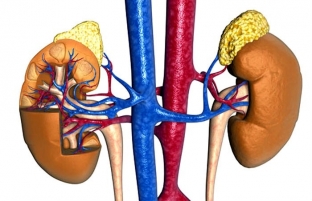Adrenals – it is a small endocrine organ that plays a very important role in the normal functioning of the entire human body. It is the adrenal glands that secrete the hormones necessary for the body, which maintain its normal state and are responsible for adapting the body to various stressful situations. Neoplasms of the adrenal glands are a fairly common pathology that requires the earliest possible start of treatment. Most often, tumors of the adrenal cortex produce hormones, thus disrupting the hormonal background and the functioning of the whole organism.
Symptoms, diagnosis and treatment of tumors of the adrenal cortex
Tumors of the adrenal cortex are hormone-producing neoplasms. Depending on what hormones they produce, a characteristic clinical picture of the disease develops. Since the adrenal cortex produces glucocorticoid, mineralocorticoid and sex hormones, the production of hormones by the tumor will depend on which zone of the cortical substance the neoplasm has developed from. Tumors of the adrenal cortex must be detected and eliminated in a timely manner, because long-term hormonal disorders can lead to irreversible changes in the patient's body.
Tumors of the adrenal cortex:
- main types of tumors of the adrenal cortex;
- methods for diagnosing tumors of the adrenal cortex;
- treatment of tumors of the adrenal cortex: surgery and hormones.
The main types of tumors of the adrenal cortex
There are five main types of tumors of the adrenal cortex: adenomas, corticosteromas, androsteromas, aldosteromas and mixed tumors. Each of these neoplasms has its own characteristic clinical picture:
- adrenal adenoma is the most common tumor of the adrenal cortex. The main symptoms of this disease are hypertension, polyuria, nocturia, and muscle weakness in the arms and legs. A high level of aldosterone in the patient's blood, hypokalemia, low plasma renin activity and metabolic alkalosis are determined;
- in corticosteroma, the production of all corticosteroids increases, as a result of which the patient develops Itsenck-Cushing's syndrome with characteristic symptoms of the pathology;
- with androsterome, an excess amount of androgens is produced in the blood – male sex hormones, resulting in hyperandrogenism;
- aldosteroma produces aldosterone in large quantities, while the patient experiences attacks of muscle weakness, convulsions and arterial hypertension;
- Mixed tumors of the adrenal cortex are manifested by a combination of symptoms of all of the above types of neoplasms of the adrenal cortex.
Methods for diagnosing tumors of the adrenal cortex
The diagnostic process of tumors of the adrenal cortex is based on anamnesis data, a characteristic clinical picture of the pathology, as well as on the results of laboratory and instrumental research methods. An important role in the diagnostic process of tumors of the adrenal cortex is played by the study of the patient's hormonal panel: depending on which hormones the tumor produces, there will be a significant increase in their amount in the patient's blood. With the help of ultrasound and computed tomography, you can get information about the size and nature of the neoplasm. The tumor is visualized as a rounded formation with smooth edges, having an average echogenicity. Scintigraphy, as an additional diagnostic method, allows for differential diagnosis between a tumor and adrenal hyperplasia.
Treatment of tumors of the adrenal cortex: surgery and hormones
Treatment of tumors of the adrenal cortex is predominantly surgical. The patient undergoes removal of only the tumor, if possible, or resection of the adrenal gland. With large neoplasms, a radical operation is necessary – adrenalectomy. To perform surgery, retroperitoneal, transthoracic, transperitoneal or lumbar-peritoneal approaches are used. In recent years, laparoscopic adrenalectomy has been widely used, which ensures minimal invasiveness of surgical intervention. After surgery, the patient is prescribed a course of hormonal therapy in order to prevent the development of acute adrenal insufficiency.








Add a comment